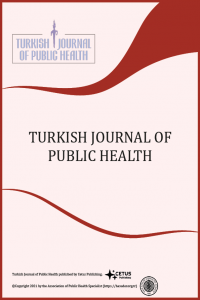Web tabanlı bir araştırmanın düşündürdükleri üzerinden LGBTİ+ sağlığı
LGBTİ bireyler, sağlık durumu, sağlık hizmeti, Web-tabanlı, sosyal medya
Rethinking LGBTI+ health through reflections on web-based research
LGBTI persons, health status, health service, web-based, social media,
___
- 1- Coffmann KB, Coffman LC, Marzilli Ericson KM. The Size of the LGBT Population and the Magnitude of Antigay Sentiment Are Substantially Underestimated. Management Science 2016; doi: 10.3386/w19508. 2- Editorial. Meeting the unique health-care needs of LGBTQ people. The Lancet 2016; 387:95. 3- European Commission. Health4LGBTI: Reducing Health Inequalities Experienced by LGBTI People. 2017 European Union. 4- Snowdon S. Medical Education: The Medical School Curriculum and LGBT Health Concerns. American Medical Association Journal of Ethics, 2010;8:638643. 5- Avinder K. Deol and Alicia Heath-Toby. HIV Risk for Lesbians, Bisexuals & Other Women Who Have Sex With Women. Gay Men’s Health Crisis. 2009. (Erişim tarihi: 04/05/2018). 6- Frisch M, Brønnum-Hansen H. Mortality Among Men and Women in Same-Sex Marriage: A National Cohort Study of 8333 Danes. Am J Pub Health. 2009;99(1):133-137. doi:10.2105/AJPH.2008.133801. 7- Sell RL, Becker JB. Sexual orientation data collection and progress toward Healthy People 2010. Am J Pub Health. 2001; 91(6): 876-82. 8- Wallick MM, Cambre KM, Townsend MH. How the topic of homosexuality is taught at U.S. medical schools. Acad Med. 1992; 67(9):601-3. 9- Brooks H, Llewellyn CD, Nadarzynski T, Pelloso FC, De Souza Guilherme F,Pollard A, Jones CJ. Sexual Orientation Disclosure In Health Care: A Systematic Review. British Journal of General Practice. 2018; 68(668):e187-e196. doi: 10.3399/bjgp18X694841. 10- Yılmaz V. Yurttaşlığı Açmak: LGBT Bireyler ve Sosyal Politikalar. Kültür ve Siyasette Feminist Yaklaşımlar. 2012; 17: 73-92. 11- Snelgrove JW, Jasudavisius AM, Rowe BW, Head EM, Bauer GR. Completely out-atsea’ with ‘two-gender medicine’: A qualitative analysis of physician-side barriers to providing healthcare for transgender patients. BMC Health Services Research. 2012; 12:110. 12- Daniel H, Butkus R. Lesbian, Gay, Bisexual, and Transgender Health Disparities: Executive Summary of a Policy Position Paper from the American College of Physicians. Annals of Internal Medicine, 2015; 163(2): 135-7 (ilave appendix). 13- Obedin-Maliver J, Goldsmith ES, Stewart L, White W, Tran E, Brenman S, Wells M, Fetterman DM, Garcia G, Lunn MR. Lesbian, gay, bisexual, and transgenderrelated content in undergraduate medical education. JAMA. 2011; 306(9): 971-7. 14- Yılmaz V, Göçmen İ. Denied Citizens of Turkey: Experiences of Discrimination among LGBT Individuals in Employment, Housing and Health Care. Gender, Work & Organization. 2016; 23(5): 470-88. 15- Karabey S. ve ark. Tıp Eğitimi ve Ayrımcılık. Yayınlanmamış Proje Raporu. 16- Drexel University Program for Lesbian, Gay, Bisexual and Transgender Health. GayData.org Web site. (bkz http://www.gaydata.org Erişim tarihi: 20/07/2010) 17- KAOS GL. Cinsel Yönelim ve Cinsiyet Temelli İnsan Hakları İzleme Raporu. Ankara. 2016. (bkz. https://aciktoplumvakfi.org.tr/Dosy alar/Yayinlar/DesteklenenYayinlar/ lgbt__insan_haklari__raporu_kaosgl_ 2016_eylul(1).pdf erişim tarihi: 04/02/2018). 18- Biçmen Z, Bekiroğulları Z. Social Problems of LGBT People in Turkey. Procedia- Social and Behavioral Sciences. 2014; 113: 224-33. 19- Engin C. LGBT in Turkey: Policies and Experiences. Social Sciences. 2015; 4: 838-58. 20- Kılıçaslan SC, Akkuş P. Türkiye’de Heteropatriarkal Sistemin Baskısı Altında LGBTİ’lerin Sosyal Hizmet İhtiyaçları. Eğitim Bilim Toplum. 2017; 14(56): 28-54. 21- Göçmen İ, Yılmaz V. Exploring Perceived Discrimination among LGBT Individuals in Turkey in Education, Employment, and Health Care: Results of an Online Survey. Journal of Homosexuality. 2017; 64(8): 1052-68. 22- Türk Tabipleri Birliği-TTB. Hekimler için LGBTİ Sağlığı. Anakara: TTB Yayınları. 2016. (pdf olarak bkz. https://www.ttb.org.tr/kutuphane/l gbti_sagligi.pdf; erişim tarihi: 28/07/2017). 23- KAOS GL. Sağlık Bakanlığı için LGBT Hakları El Kitabı. Ankara. 2016. (pdf olarak bkz. http://www.kaosgldernegi.org/resi m/yayin/dl/icisleri_bakanligi_icin_lg bt_haklari_el_kitabi.pdf, erişim tarihi: 28/07/2017). 24- LGBTI. 2015. (http://fra.europa.eu/en/theme/lgb ti; erişim tairihi: 30/07/2017). 25- QuickStats: Percentage of Young Adults Aged 18-29 Years with Selected Chronic Conditions, by Sex. National Health Interview Survey, United States, 2005-2007. 2009. (https://www.cdc.gov/mmwr/preview/mmwrhtml/mm5825a3.htm ; erişim tarihi: 25/07/2017) 26- Daulaire N. The Importance of LGBT Health on a Global Scale. LGBT Health. 2014; 1(1): 8-9. 27- OECD. Health at a Glance 2015: OECD Indicators (s: 68 ve 71). 2015. (bkz: http://apps.who.int/medicinedocs/ documents/s22177en/s22177en.pd f; erişim tarihi: 30/07/2017) 28- OECD. Data: Alcohol Consumption. 2017. (bkz: https://data.oecd.org/healthrisk/alc ohol-consumption.htm; erişim tarihi: 30/12/2017) 29- Diamant AL, Schuster MA, Lever J. Receipt of preventive health care services by lesbians. American Journal of Preventive Medicine. 2000; 19(3): 141-8 30- Petroll AE, Mosack KE. Physician awareness of sexual orientation and preventive health recommendations to men who have sex with men. Sexually Transmitted Diseases. 2011; 38(1): 63-7. 31- Tracy JK, Schluterman NH, Greenberg DR. Understanding cervical cancer screening among lesbians: a national survey. BMC Public Health. 2013; 13(442).
- Başlangıç: 2003
- Yayıncı: Halk Sağlığı Uzmanları Derneği
Sagvan Hasan ALİ, Bakhtiyar Ahmed RASHEED, Tariq Salman AL-HADİTHİ
Bütünsel sağlık için yeni bir kavramsal çerçeve
Bir ilçede bulunan okul kantinlerinin hijyen koşulları ve gıda güvenliği açısından değerlendirilmesi
Leyla ÜÇEŞ HARMANOĞULLARI, Gülçin YAPICI
The effects of personality traits and other variables on the specialty choices of resident doctors
Nalan AKİS, P. Eylul TANERİ, Guliz AVSAR BALDAN, Aysegul AYDİN
Web tabanlı bir araştırmanın düşündürdükleri üzerinden LGBTİ+ sağlığı
Yeşim YASİN, M. Müjde ÇEBİ, İpek ŞAPÇI
Merve KARAÇALI, Raziye ÖZDEMİR
Yaşlılarda yaşam kalitesini etkileyen faktörler
Özgür ÖZERDOĞAN, Buse YÜKSEL, Merve ÇELİK, Sibel OYMAK, Coşkun BAKAR
Elektrik alan seviyeleri ve halk sağlığı açısından değerlendirilmesi: Samsun şehir merkezi örneği
